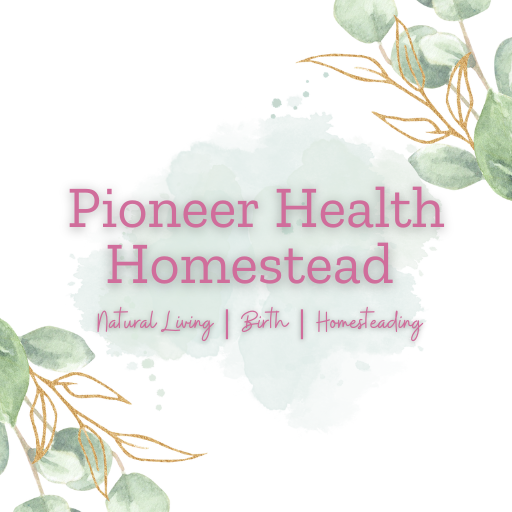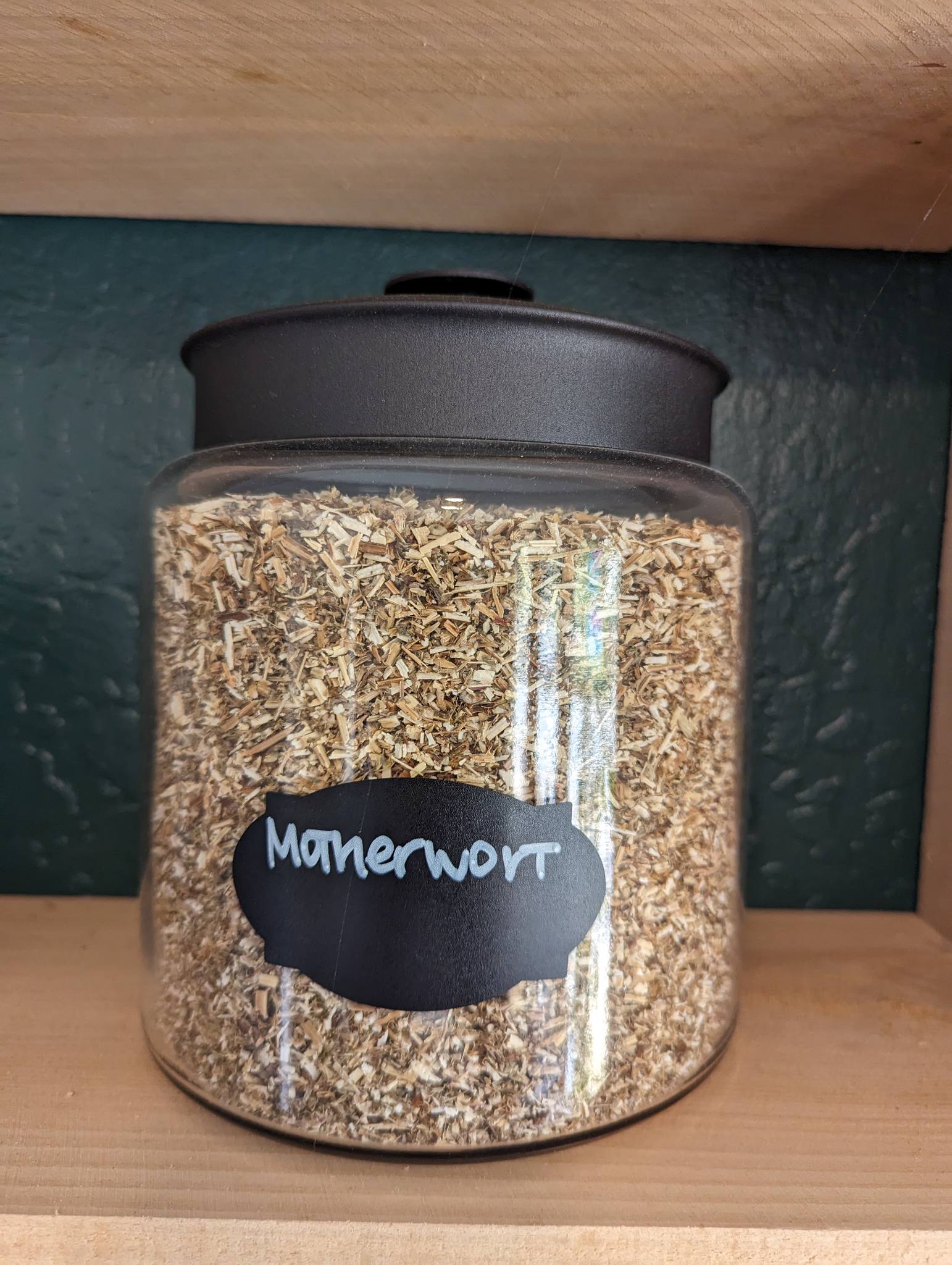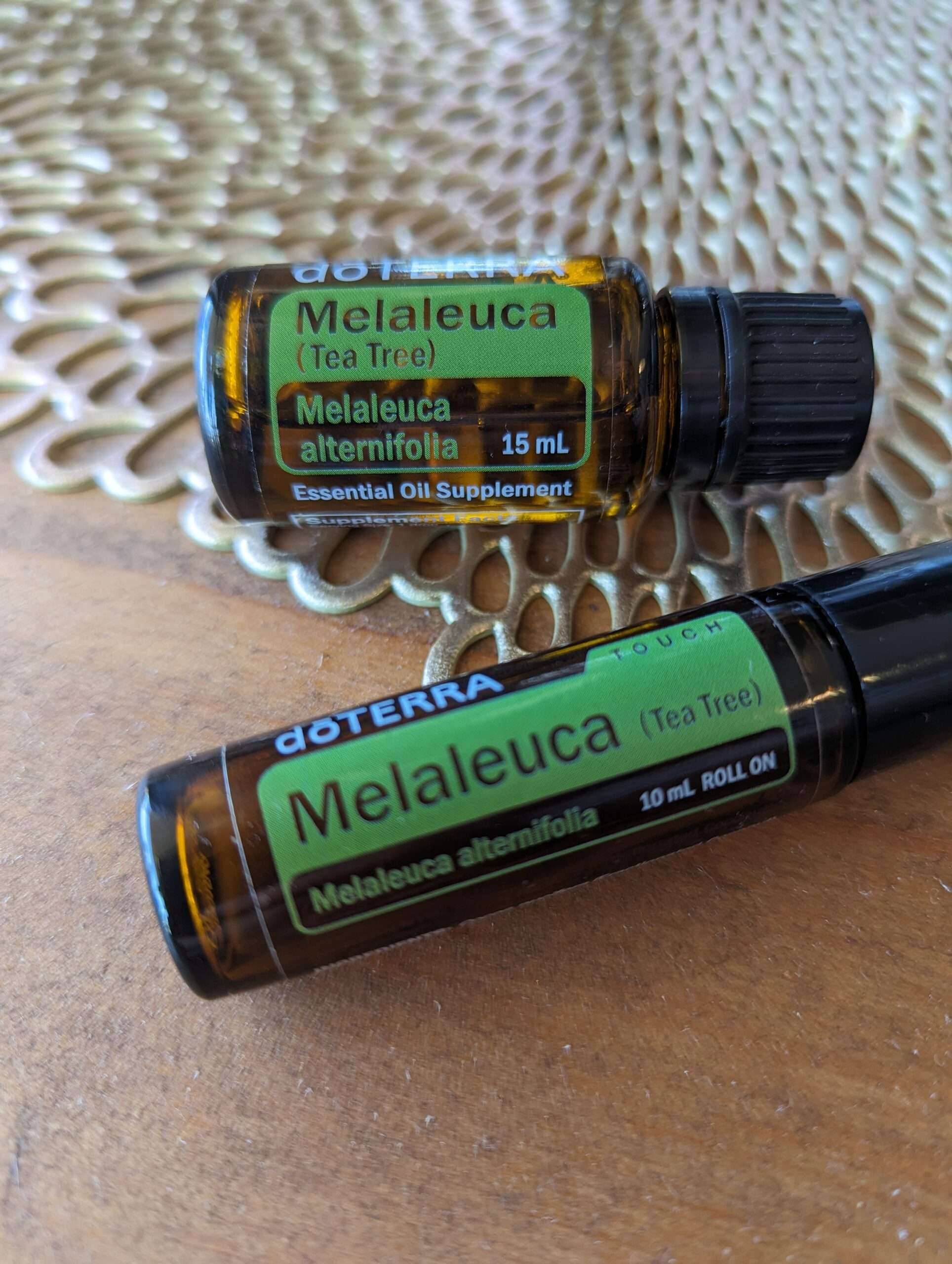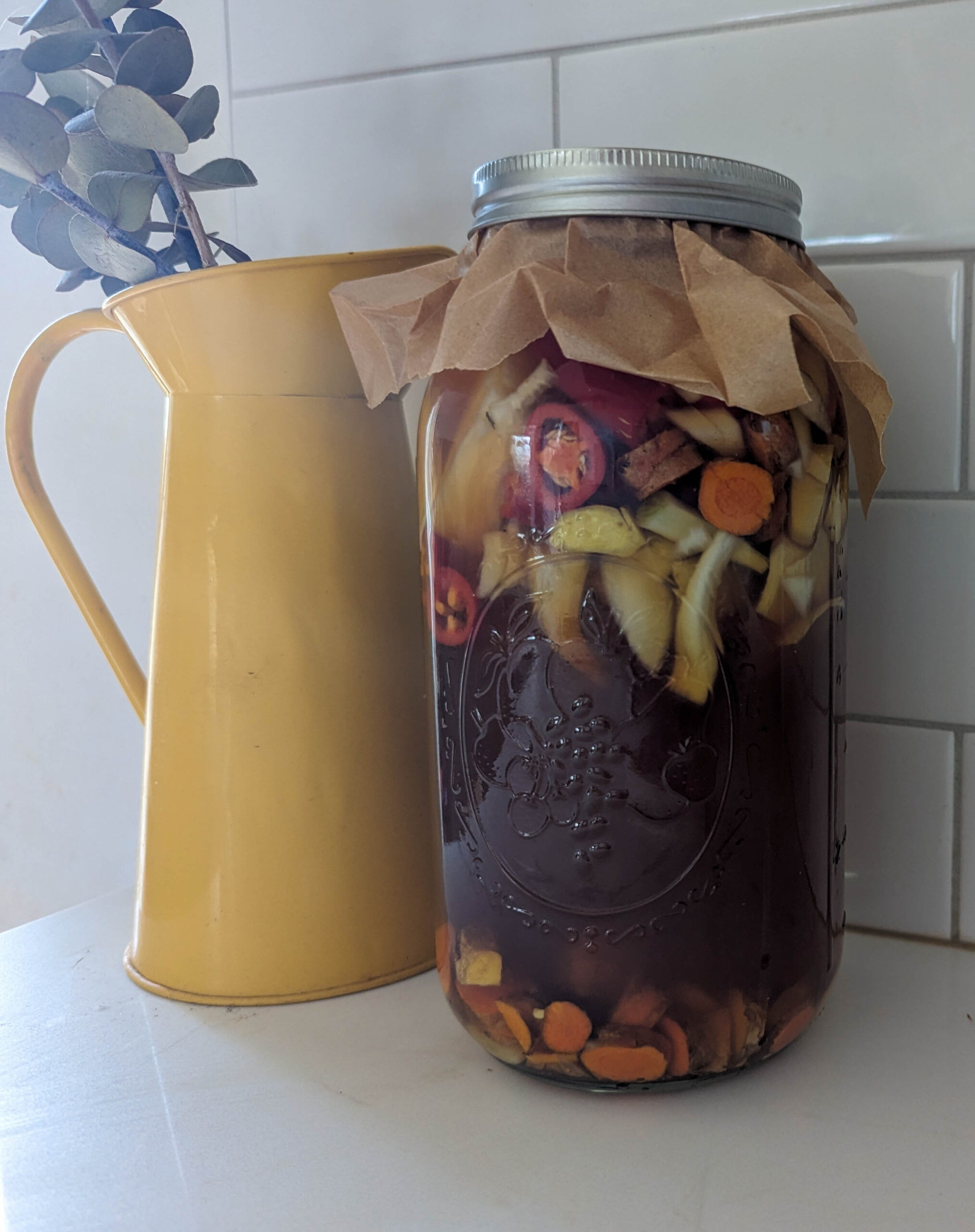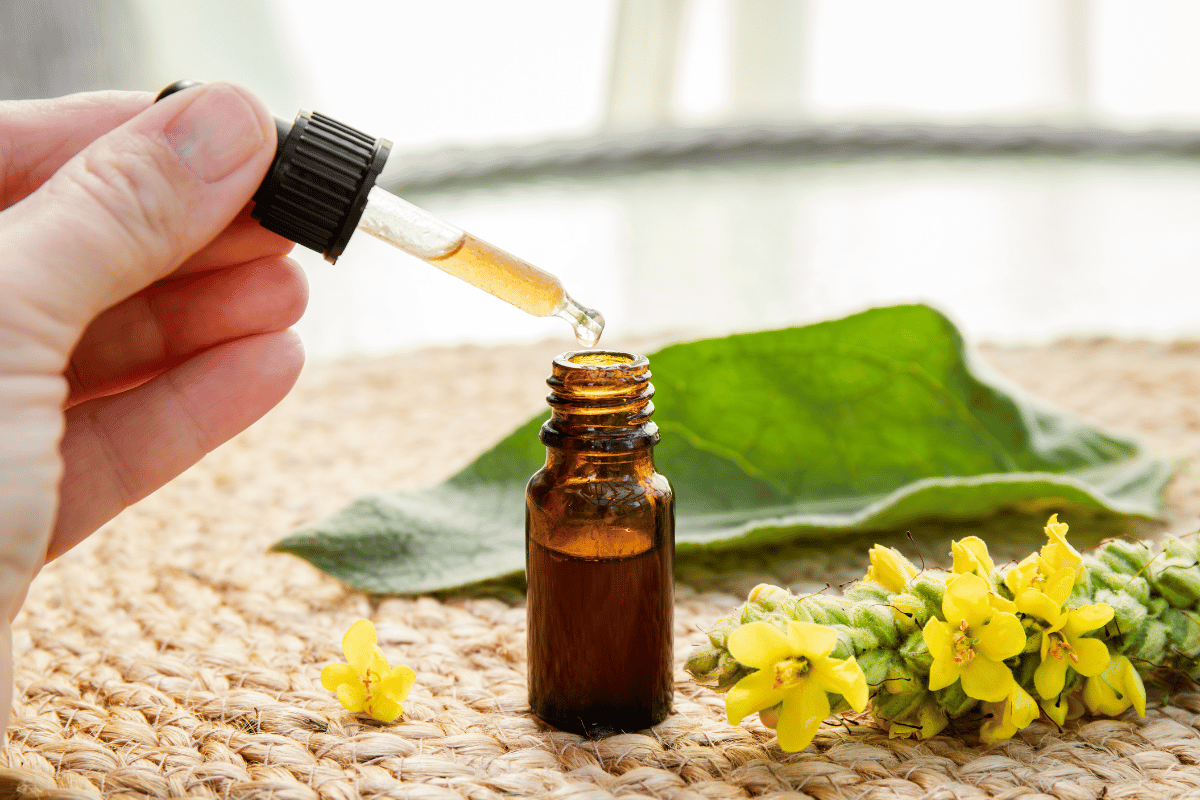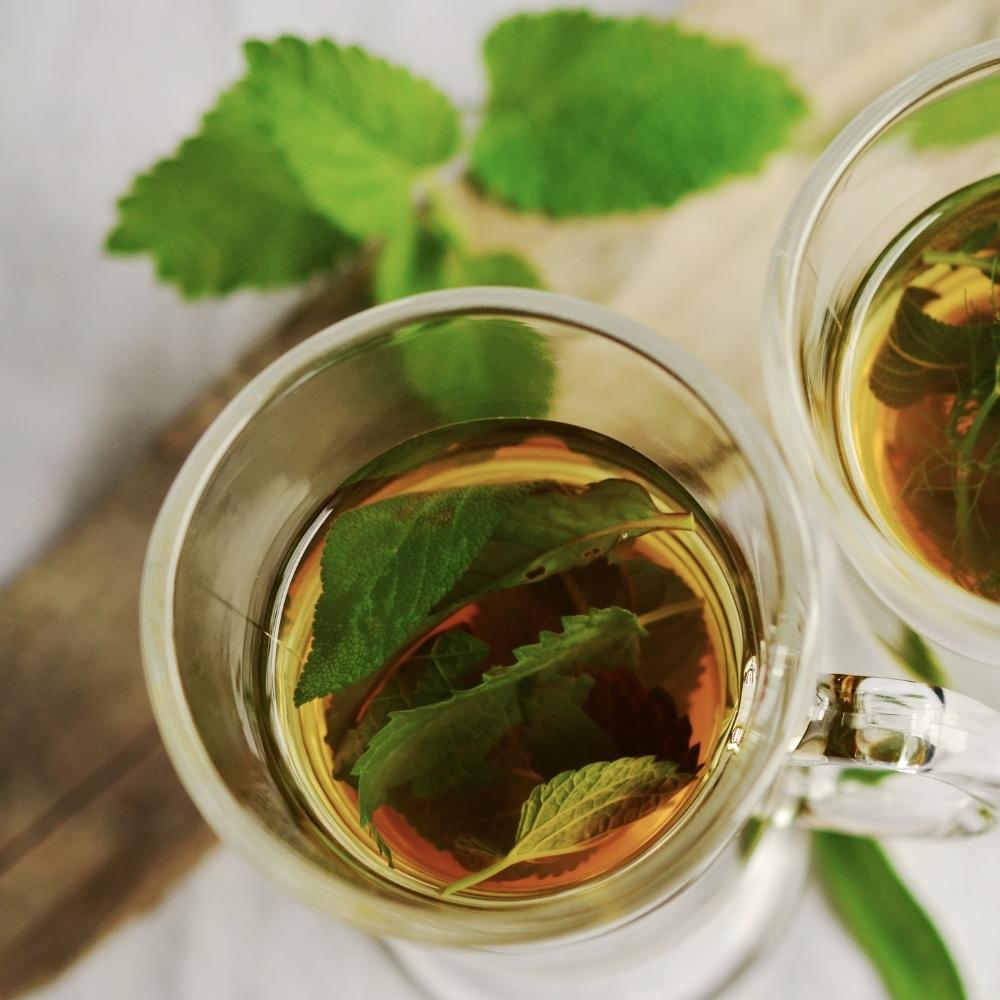Best Herbs for Anxiety While Breastfeeding: Herbal Remedies
Here are the 13 best herbs for anxiety while breastfeeding, their herbal class, descriptions of each, any cautions or side effects, and the best way to consume for anxiety use.
Herbalism today is also known as alternative medicine. There are a lot of herbs that are used for anxiety but not all of them are safe for when pregnant or breastfeeding. I will be focusing mainly on postpartum anxiety and what herbs and herbal remedies are the best treatment options that are also safe and effective while breastfeeding.

After reading what the 13 best herbs for anxiety while breastfeeding are, it will be up to you and your healthcare provider to decide which will work best for your particular circumstances. Every postpartum recovery, new mothers, and health history will be different. There is no one perfect herb for everyone.
While I am a registered nurse (RN, BSN), I am not a medical doctor. Please take this education and speak with your healthcare provider before taking these herbs.
What is anxiety?
I’m sure most have heard of the medical diagnosis of anxiety. Many have probably experienced anxiety and other mental health conditions in one form or another at some point in their lives.
Anxiety is defined as a feeling of nervousness, worry, or unease. These feelings typically come about an upcoming event or uncertain outcome. Anxiety is not the same as fear although it is sometimes used interchangeably. These feelings of anxiety and panic can interfere with daily life, can be difficult to control, are out of proportion to the actual danger, and can last a long time.
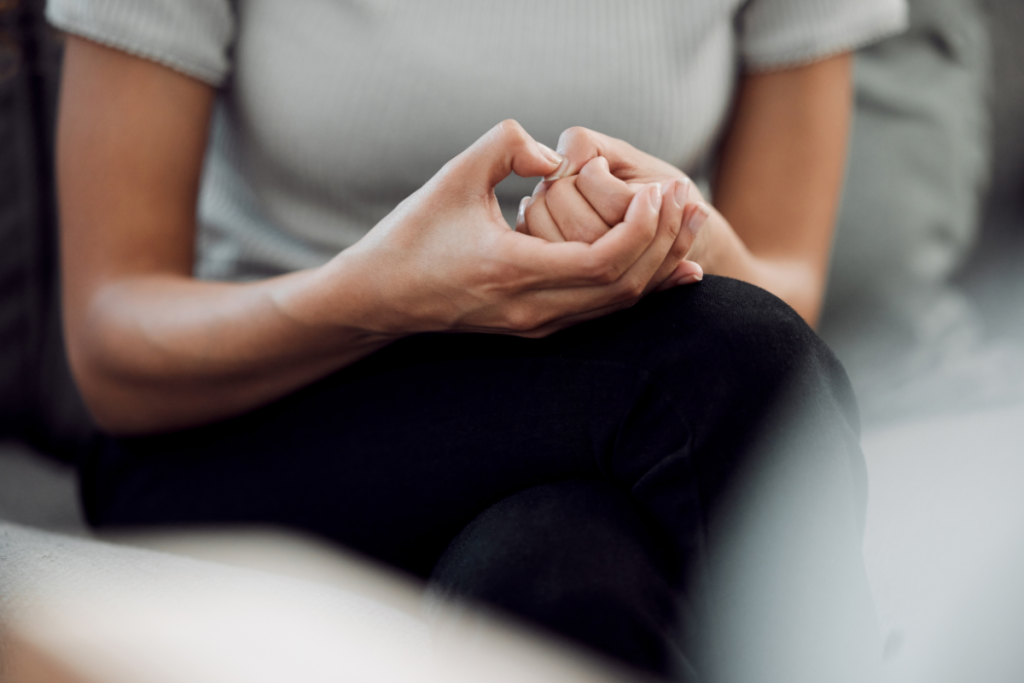
Some examples of anxiety disorders are generalized anxiety disorder (GAD), social anxiety disorder (social phobia), certain phobias, and separation anxiety disorder. Even so, you can have more than one anxiety disorder at a time. Sometimes anxiety results from a medical condition that would require medical treatment. Also, postpartum depression, or baby blues, can also manifest as anxiety.
Some of the most common anxiety signs and symptoms include:
- Feeling nervous, restless, or tense
- Having a sense of impending danger, panic, or doom
- Having an increased heart rate (tachycardia)
- Increased blood pressure (hypertension)
- Panic attacks, breathing rapidly (hyperventilation)
- Sweating (diaphoresis)
- Trembling
- Feeling weak or tired (exhaustion)
- Trouble concentrating or thinking about anything other than the present worry
- Having trouble sleeping (insomnia)
- Experiencing gastrointestinal (GI) problems (stomach upset)
- Having difficulty controlling worry
- Having the urge to avoid things that trigger anxiety (people, places, situations)
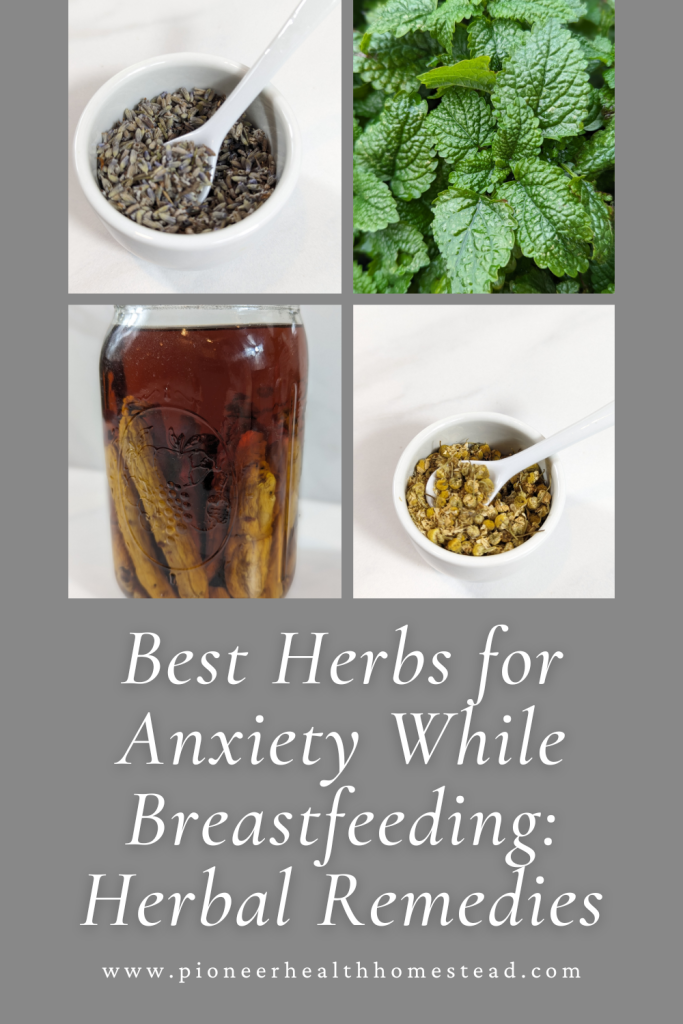
Postpartum Anxiety
As many as 1 in 5 new moms experience mental health challenges after giving birth. Postpartum anxiety is one of the most common after-birth challenges. Postpartum anxiety is excessive worrying that occurs after childbirth or adoption. For many women, the abrupt decrease in estrogen and progesterone at the time of delivery can lead to a greater sensitivity to stress, causing some women to feel overwhelmed, fearful, or panicky. Sleep deprivation from newborn care can also contribute to these feelings. If this is your first baby, this abrupt change in hormones may come as a surprise to you.
Postpartum depression is also something that can happen with abrupt changes in hormones after giving birth. This medical diagnosis should always be considered in conjunction with postpartum anxiety. Generally, they can go hand in hand.
Acute vs chronic anxiety
Acute anxiety is anxious feelings over a single or short-term future event. Chronic anxiety is when the feelings do not dissipate over time but continue. It is considered a form of anxiety that lasts for a very long time. Postpartum anxiety would mostly be classified as acute anxiety unless it persists long after giving birth.
Concerns when breastfeeding
Today’s medical model typically prescribes medication for those suffering from mental illness, including anxiety. Most medication inserts will state that studies have not been sufficiently conducted on pregnant and breastfeeding women to define if it’s safe or harmful, or showing up in the milk supply. Some medications have been studied in the breast milk of women and will have a ranking. It is best to ask your doctor prescribing medications about the studies and findings on if it passes through the breastmilk and if so, what were the outcomes to the babies that received that milk.
An example of prescription medications that are commonly prescribed for anxiety is Benzodiazepines (diazepam, lorazepam, alprazolam). These act very quickly to reduce anxiety but cannot be taken long-term because they can become addictive. These have also been found to accumulate in the breastfed baby leading to drowsiness and poor feeding. Another class of medication used for treating anxiety symptoms is selective serotonin reuptake inhibitors (SSRIs). If you are already taking this medication, you will need to check with your pharmacist or other healthcare professional on any potential adverse reactions while taking certain herbs.
I imagine if you’re reading this post that you would like to try natural remedies before medications and potential side effects for your baby.
Forms herbs can be taken
Herbs can be taken in many different forms. Certain herbs are best taken in a certain form, but generally, these can be taken whichever way works best for you.
Forms herbs can be taken are:
- teas
- tinctures/glycerites
- capsules
- decoctions
- herbal baths
- herbal salves
- essential oils
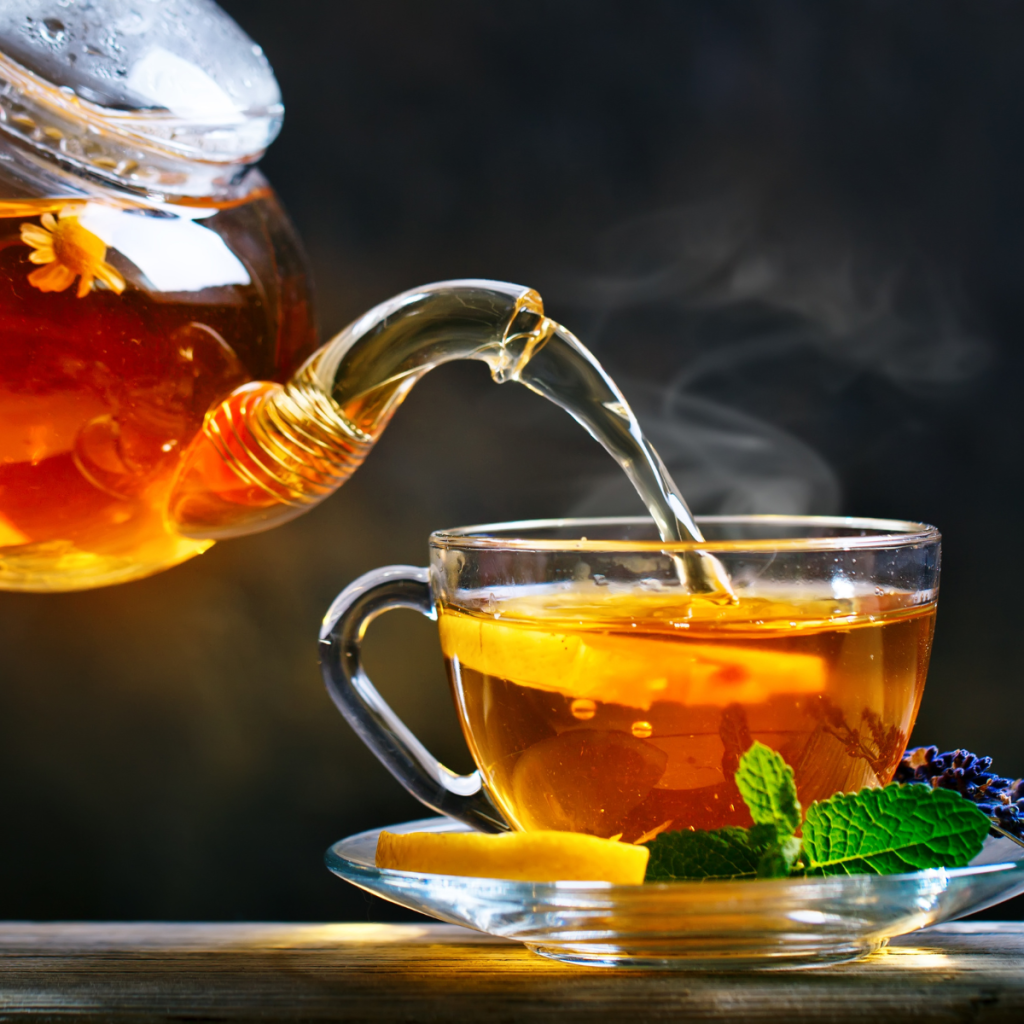
In each herb below I will mention the best way to take that herb and if in conjunction with any other herb for maximum effects.
Download my FREE Herbal Recipe eBook below for more details on how to make and take herbs in the above-mentioned forms.
Classes of herbs best for anxiety while breastfeeding
The most common types of herbs for treating anxiety are adaptogenic, nervine, relaxant, and sedative herbs.
An adaptogen herb can help you adapt. Calming adaptogens work either by supporting your nervous system and decreasing nervous and emotional tension or by working directly with the body’s physiological processes to maintain health. Nervines support and strengthen the nervous system. Relaxants relax the nervous system. Sedatives reduce nervous activity.
The herbs below will be best used knowing what class of herb they are and exactly what your symptoms are with anxiety. Matching herbs together and figuring out what works best for each person will vary. Based on my research and some from personal experience, the herbs listed below are the top 13 herbs for anxiety while breastfeeding.
Best herbs for anxiety while breastfeeding
Herbal medicine should never be taken lightly without education on use and side effects. It is a good idea to always seek medical advice when taking herbs while breastfeeding from a qualified medical professional who knows your medical history.
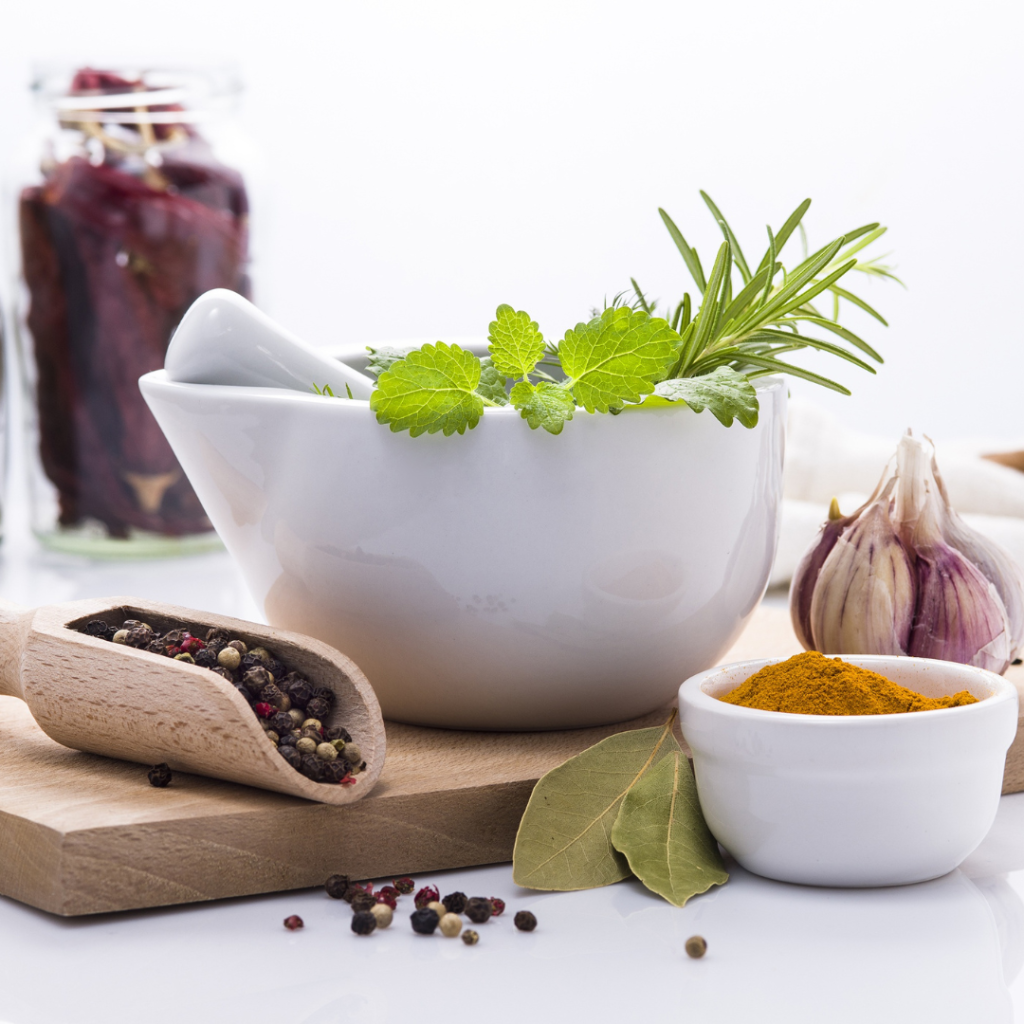
The 13 best herbs for anxiety while breastfeeding are:
- Ashwagandha
- Bacopa
- California poppy
- Catnip
- Chamomile
- Eleuthero
- Ginseng, Chinese Ginseng, Ren Shen
- Holy basil
- Lavender
- Lemon balm
- Passionflower
- Skullcap
- Valerian
Check out my resource page for best places to buy herbs and equipment.
Ashwagandha
Ashwagandha (Withania somnifera) is a nervine that can help with anxiety, depression, and exhaustion. It’s an adaptogenic herb and reduces the effects of stress while promoting energy. It has been said that this herb was designed to deal with our busy day-to-day lives as it can ease the impact of stress and anxiety, while also aiding in sleep. Ashwagandha has plenty of health benefits that have been greatly supported today by clinical studies. It has been proven to reduce anxiety in 6 different clinical trials.
A caution for this herb is not to use it during pregnancy as it can lead to a miscarriage. If you have a sensitivity to the nightshade family you should avoid this herb as well.
This is best taken as a decoction, capsule, or tincture. Take 4-8 oz 3 times a day as a decoction. As a tincture take 1-10ml 3 times daily. In capsule form take 2-6 capsules 3 times daily.
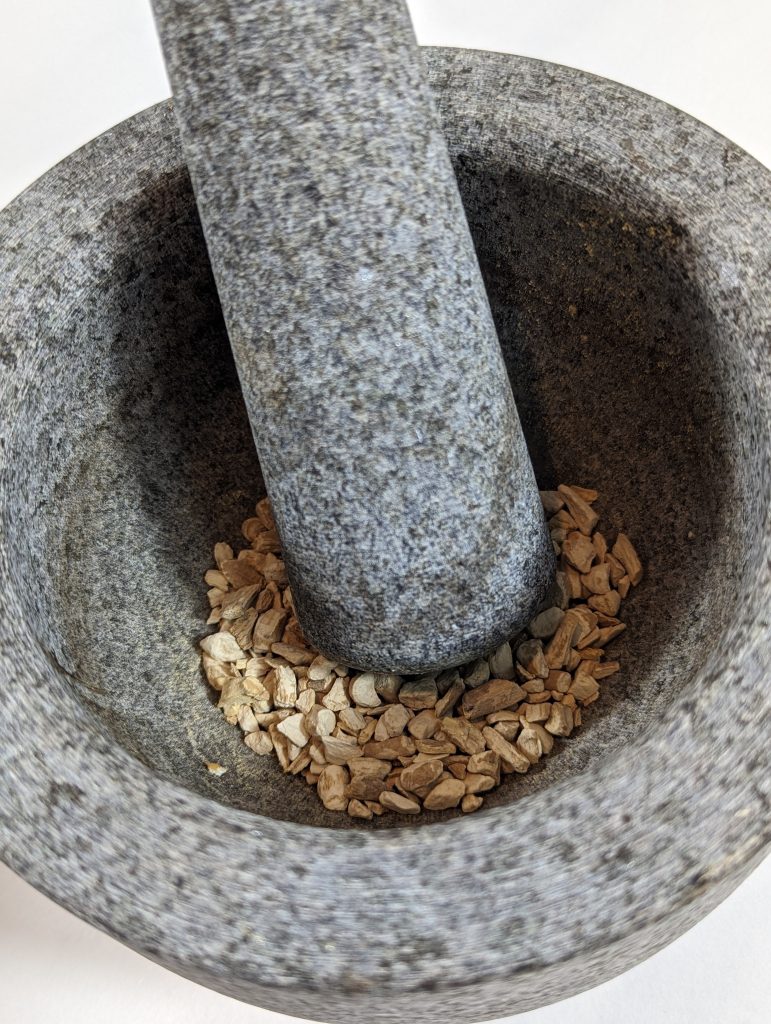
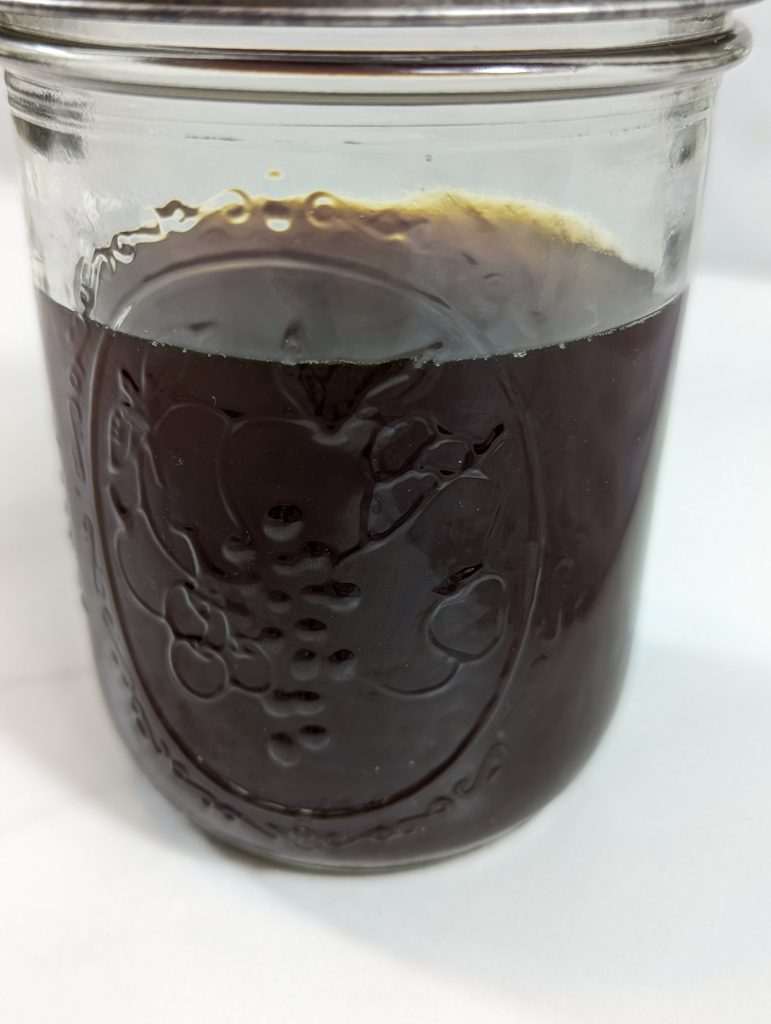
Bacopa
Bacopa (Water Hyssop) (Bacopa monnieri) is a nervine herb. This herb is used to treat nervous disorders such as anxiety, seizures, and forgetfulness. It is best known today for helping improve brain function.
Do not use with hyperthyroidism.
This herb is best taken as a weak infusion, tincture, or capsule. For taking it as a weak infusion, take 1 cup up to 3 times a day. As a tincture, take 1-3ml 3 times a day. As a capsule take 400-500mg standardized extract twice daily.
California poppy
California poppy (Eschscholzia californica) is in the same family as the opium poppy but is not a narcotic. This herb is a sedative while also helping with mild pain. California poppy helps ease nervous tension, anxiety, and insomnia. It works on the GABA receptors in the brain, enabling it to calm the mind without depressing the central nervous system (CNS).
This is not to be used during pregnancy unless supervised by a trained professional.
Best taken as a standard infusion or tincture. For a standard infusion take 2-4 oz at night to help quiet the mind and promote restful sleep. To take as a tincture, take 0.5-2ml in at least 2oz of water or chamomile tea as needed.
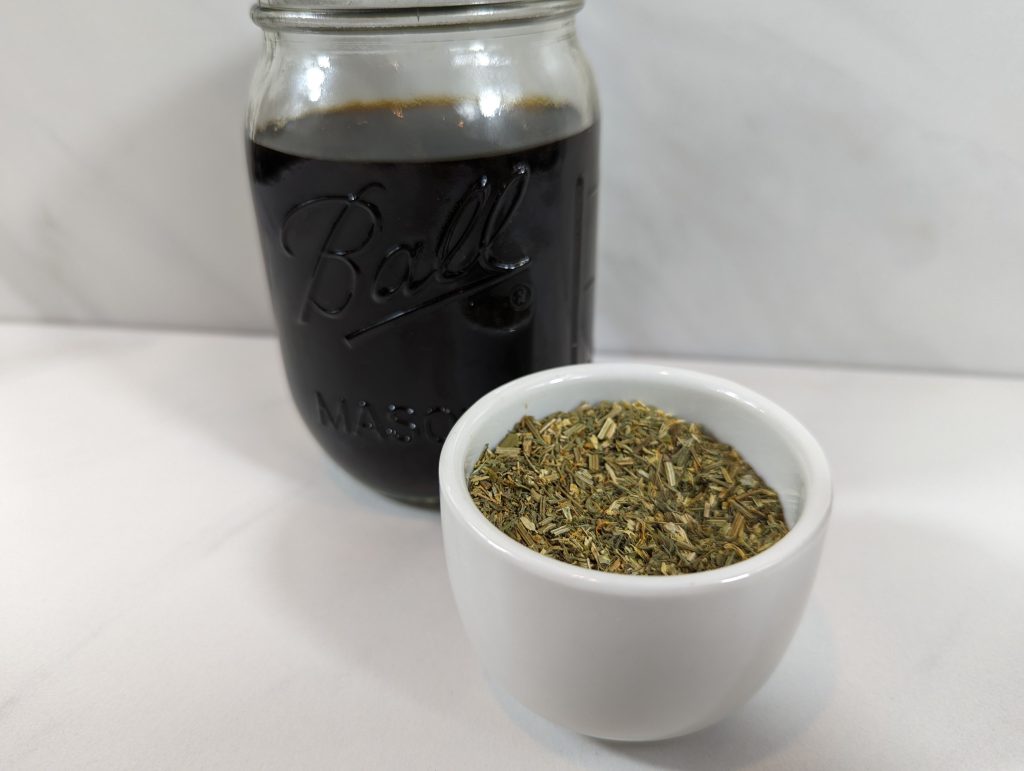
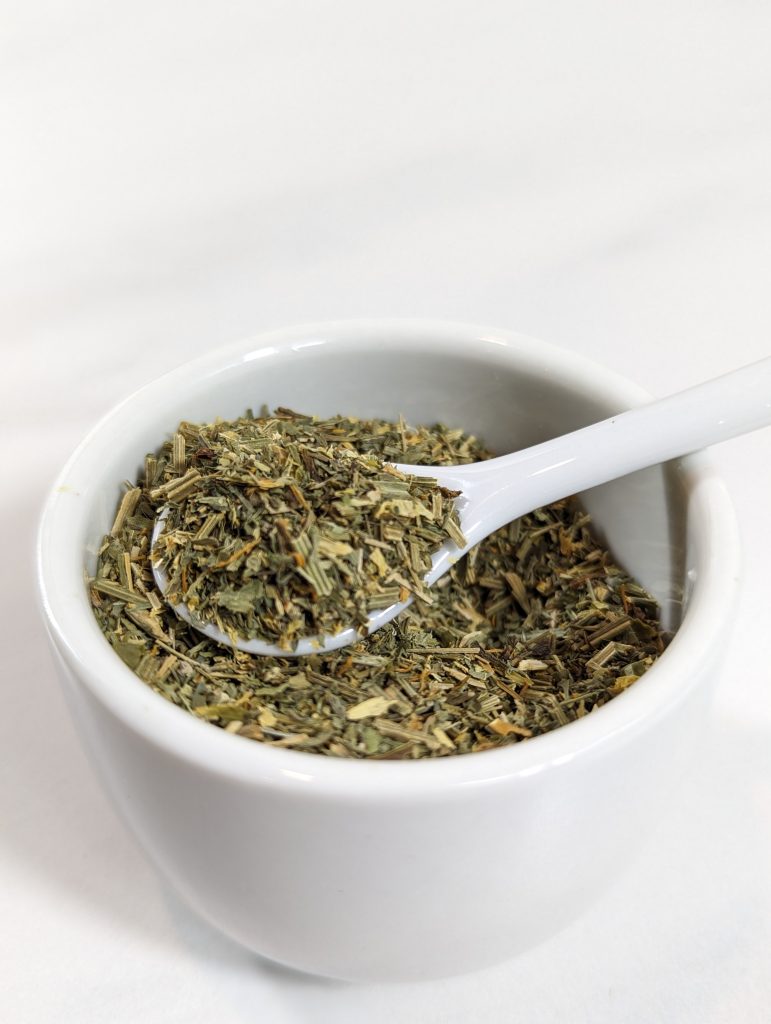
Catnip
Catnip (Nepeta cataria) is a nervine and sedative herb. It is soothing to your nerves and used for nervousness or stress and at bedtime to help with sleep.
This herb is great for children and babies except you should avoid using it in large amounts. Pregnant women should avoid this herb.
This herb is taken as a standard infusion, tincture, or glycerite. Taken as a standard infusion take 2-6oz up to 3 times a day. As a tincture take 1-5ml up to 3 times a day. As a glycerite take 1-2 tsp up to 3 times a day.
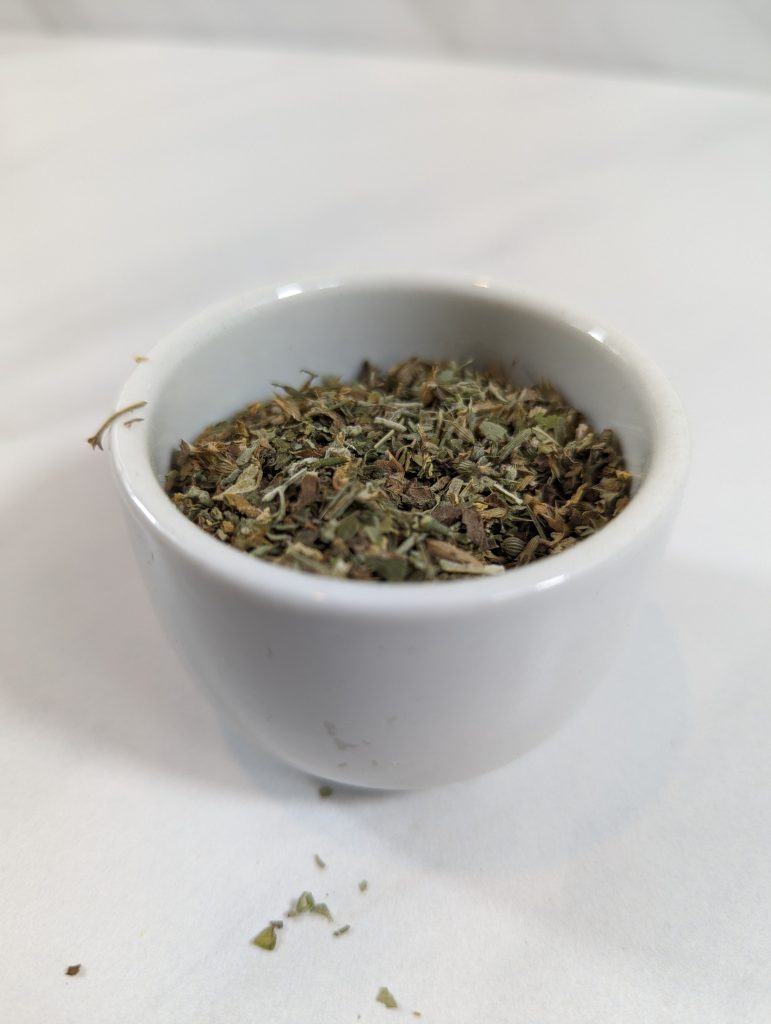
Chamomile
Chamomile (Chamomilla recutita, Matricaria recutita) is a mild sedative and nervine herb. It is probably one of the best-known herbs to use for making herbal teas. This is especially excellent for children as an all-around calming herb. It cannot only help a breastfeeding mother with her anxiety, but this can also help their baby with colic, hyperactivity, teething, fussiness, fever, or irritability. It calms the nerves and can even help expel gas.
Allergic reactions are not common with this herb but are possible.
Best taken as a tea or cold infusion, tincture, or glycerite. As a tea or cold infusion take 2-8oz up to 3 times a day. As a tincture or glycerite take 1-5ml 1-4 times daily.
This herb is also popular as an essential oil and can be diffused or applied diluted or neat to the palms of hands and breathed in several times.
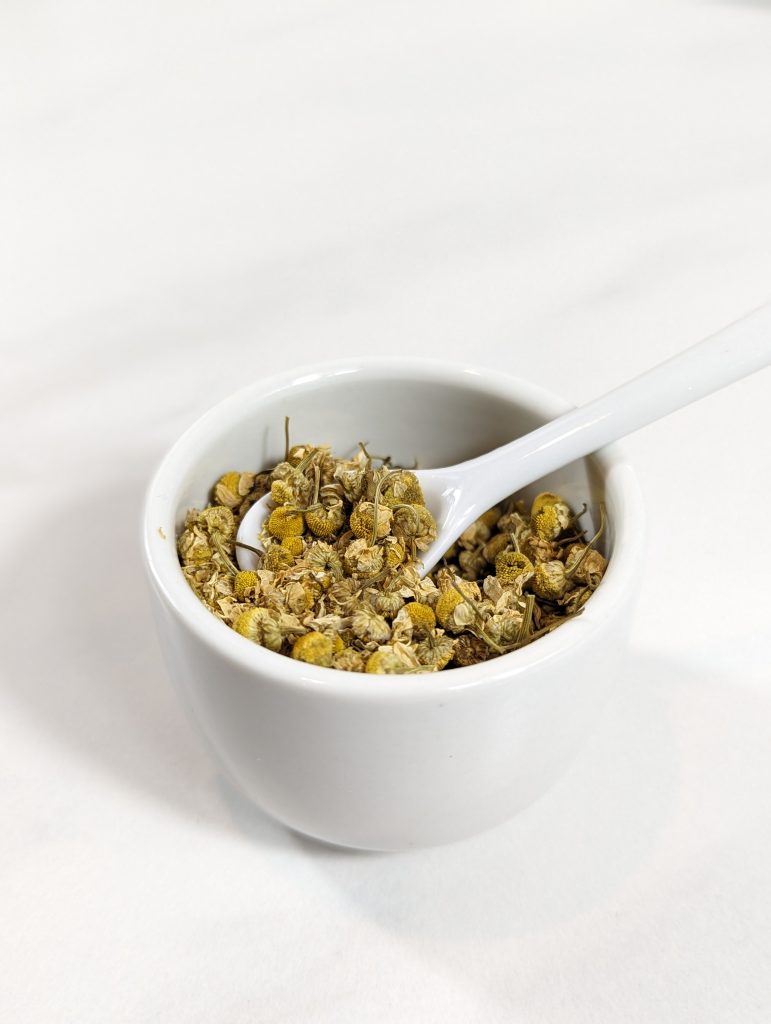
Eleuthero
Eleuthero (Eleutherococcus senticosus) is an adaptogen herb and is also known as Siberian ginseng. This is one of the most studied herbs in history and has plenty of clinical research showing that it helps the body cope with stress. It can also help with improved concentration. What breastfeeding mother can’t use more help in that department?
This can be a bit more stimulating than other herbs and should only be used short term, less than 6 weeks. If used too long it can start to inhibit your sleep. It is also recommended to avoid caffeine while taking this herb to avoid overstimulation.
This herb can be taken as a decoction, tincture, glycerite, or capsule. As a decoction take 2 T twice a day as a general tonic. As a tincture for short-term use, take 10 drops to 5ml 3 times a day. For normal daily use as part of a formula, take 1-3ml. As a glycerite take 5-10ml 2-3 times a day. In capsule form take 500-1000mg 2-3 times a day.
Ginseng, Chinese Ginseng, Ren Shen
Ginseng (Panax ginseng) is probably the most famous Chinese herb. It is an adaptogenic herb that has been shown to be able to reduce stress and balance a person’s mood.
Young healthy adults should not take this longer than 6 weeks. Do not exceed the dosage as it can cause insomnia and hypertension (high blood pressure). Caution should be used if taking a blood thinner (anticoagulant) medication. It would be best to have a qualified professional oversee your care if so. If taking this herb you should avoid caffeine and if you are pregnant.
Best taken in a standard decoction, tincture, glycerite, and capsule. As a standard decoction take 2-4oz 2 times daily. For tincture, you would take 1-2ml 1-3 times a day. As a glycerite take 1-3ml 1-3 times a day. Taken as a capsule, or as a dietary supplement, is a large dose for most people. Only 500mg 1-2 times a day is normally all that is needed.
Another common way to take this herb is to cook with it in soup. You can add 1g dried root per portion of vegetable soup daily.
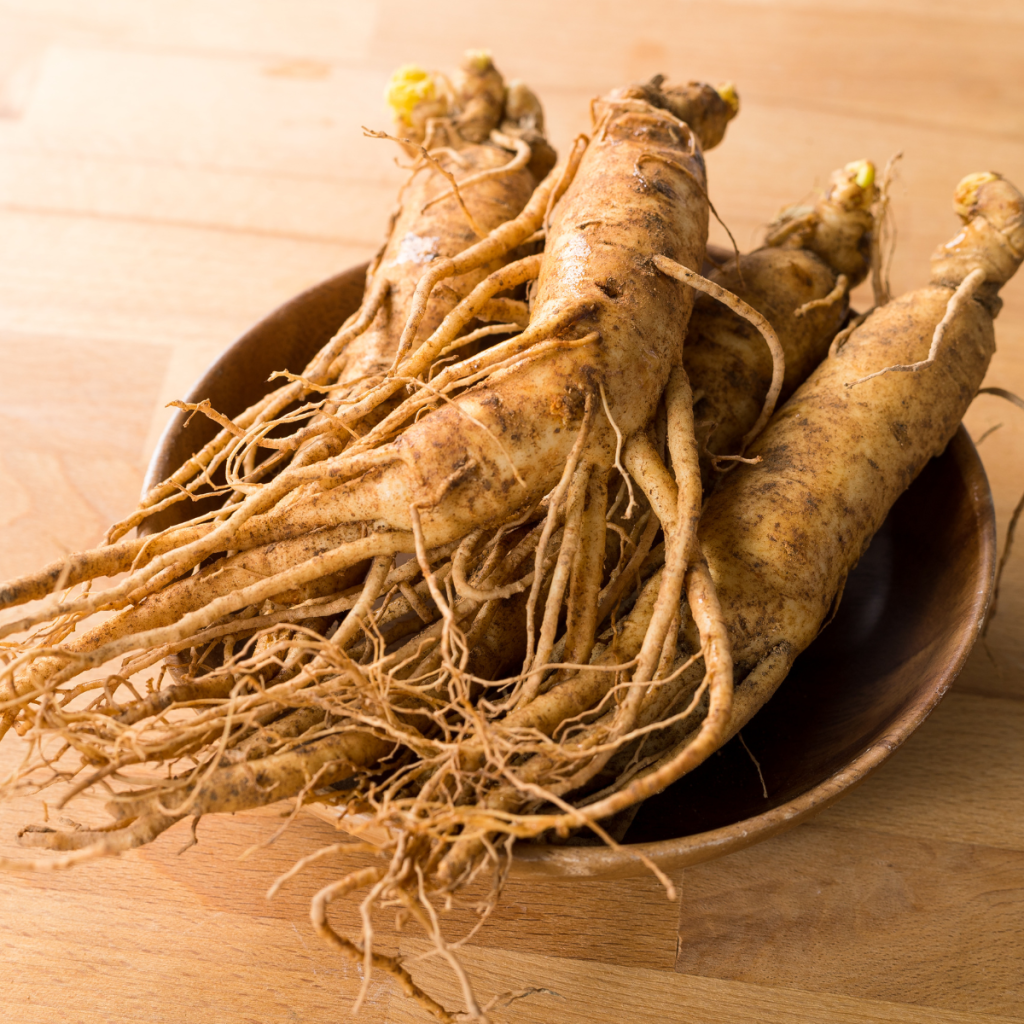
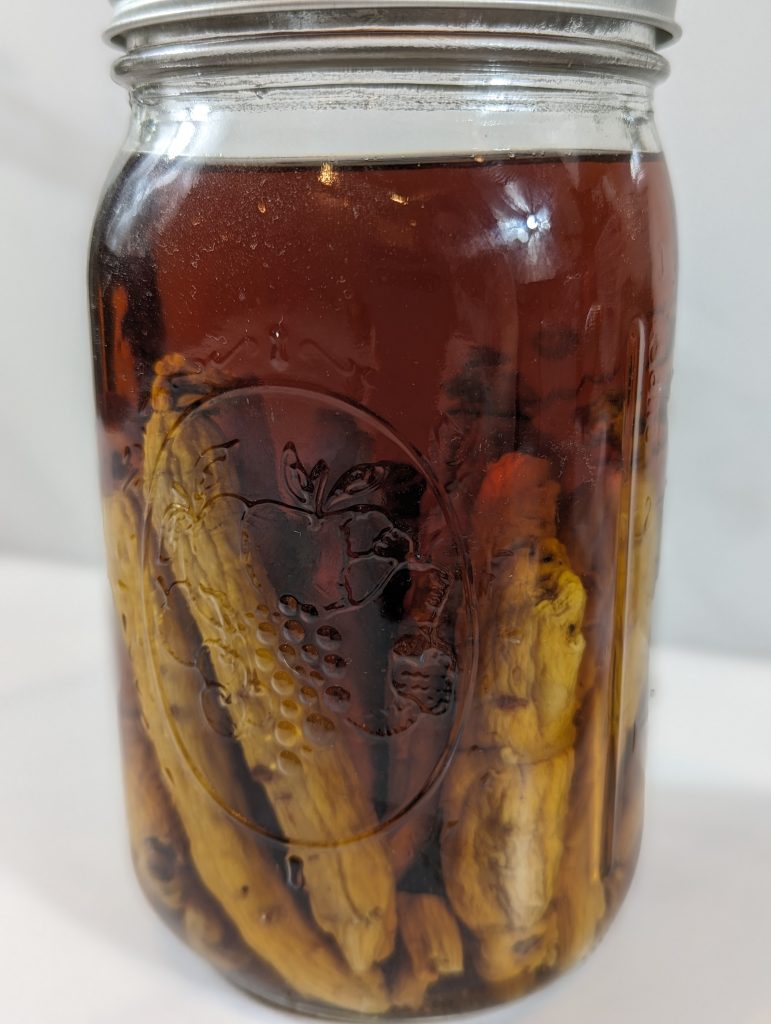
Holy basil
Holy basil (Ocimum sanctum) is considered an adaptogenic herb. It can protect the heart from stress and can lower blood pressure. It can also reduce feelings of stress and anxiety. Holy basil is considered that all basils can increase joy and happiness feelings.
There are no warnings or cautions with holy basil.
It is best taken as a standard infusion or tincture. A standard infusion take 4-8oz 3 times a day. As a tincture take 2-4ml 3 times a day.
Of course, you can also use it to cook with or make infused water. This is a very easy herb to grow on your balcony or in your herb garden.
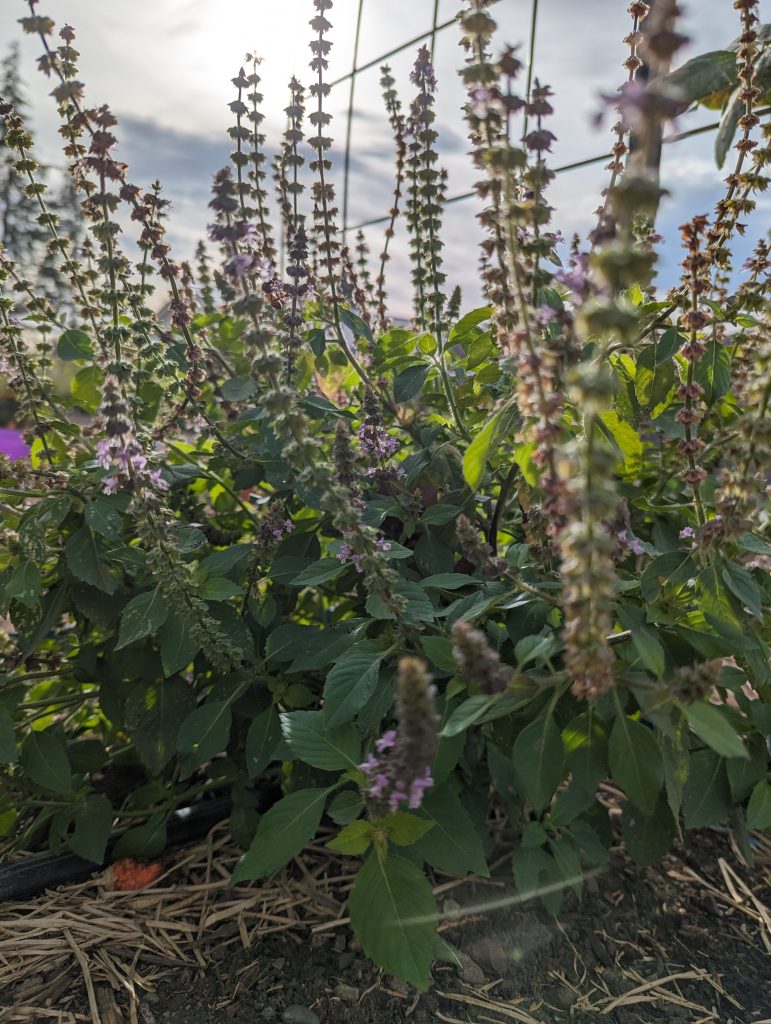
Lavender
Lavender (Lavandula officinalis, syn. L. angustifolia) is a relaxing nervine that I’m fairly certain everyone has heard of and possibly tried as an essential oil at some point. Lavender helps ease tension and anxiety very well. It is specifically for those who are high-strung, nervous, self-absorbed, and need to relax. It can lift your mood and is a mild antidepressant.
There are no warnings or cautions with lavender.
This can be taken as a standard infusion, tincture, or essential oil. As a standard infusion take 4-8oz 1-4 times a day. As a tincture take 1-3ml up to 3 times a day. Taken as an essential oil, you can diffuse, apply neat to the palms of your hands, and breathe in several times. Can also apply it diluted to your wrists and the back of your neck. Used with Epsom salts in a bath can be a great way to relax.
I find using lavender essential oils with orange essential oil to be the best relaxing scent I have ever encountered. I can put this in a roller and keep in my purse for easy use. When I am home I can put this combination into my diffuser or use it with the Epsom salts in a bath.
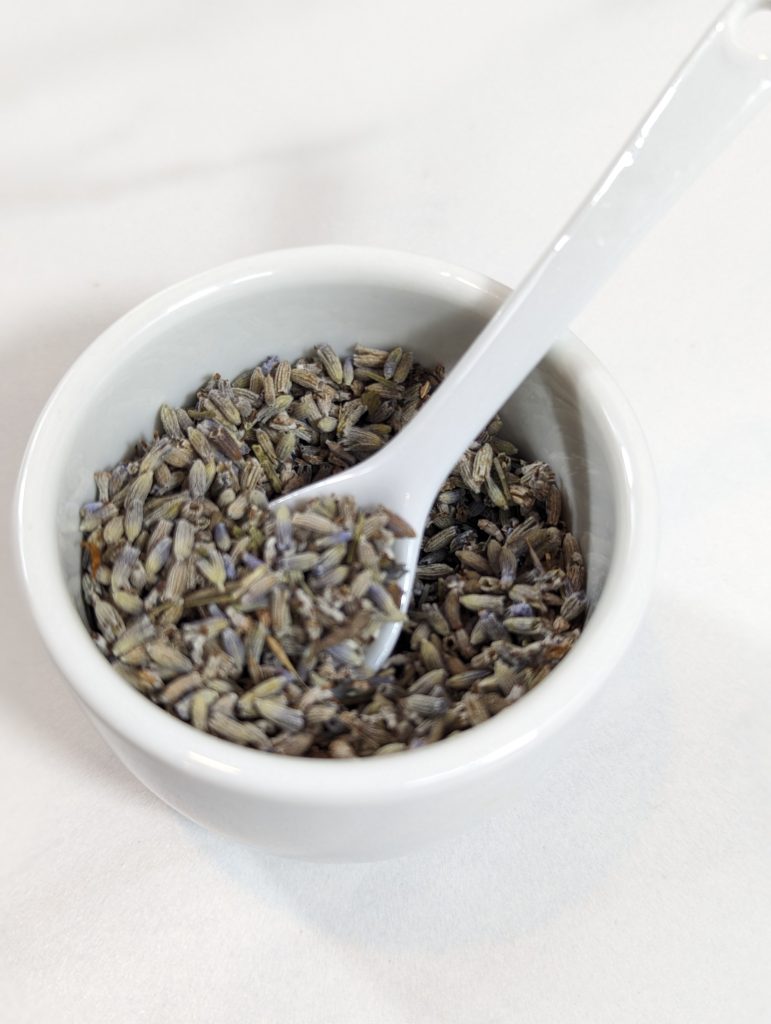
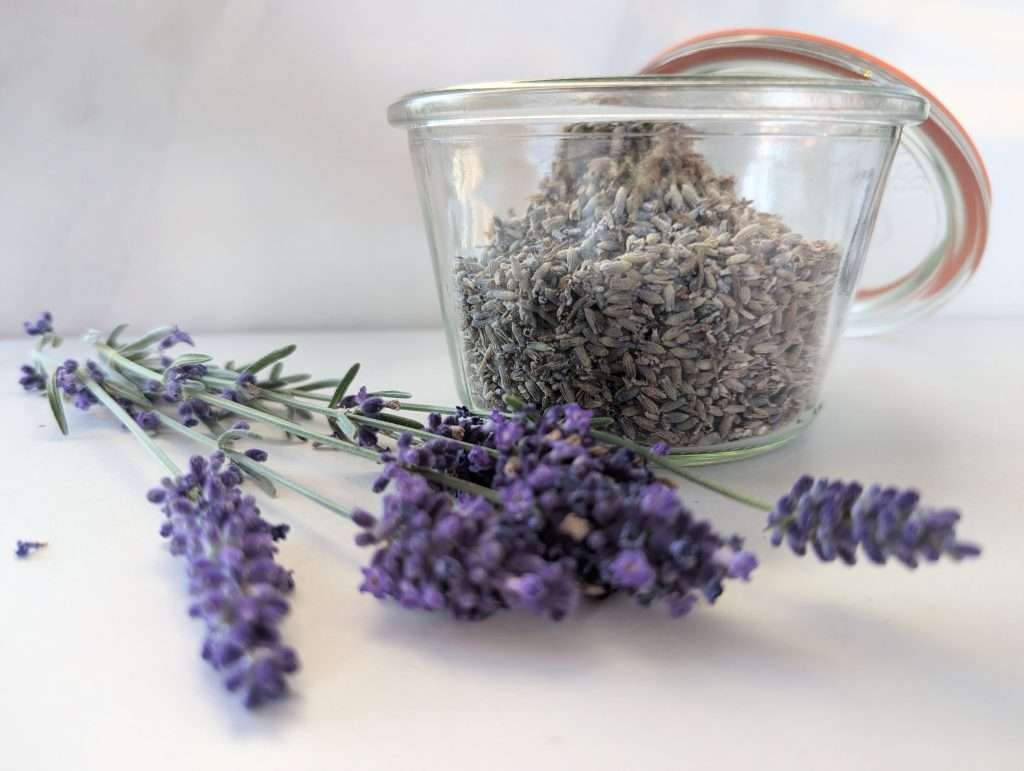
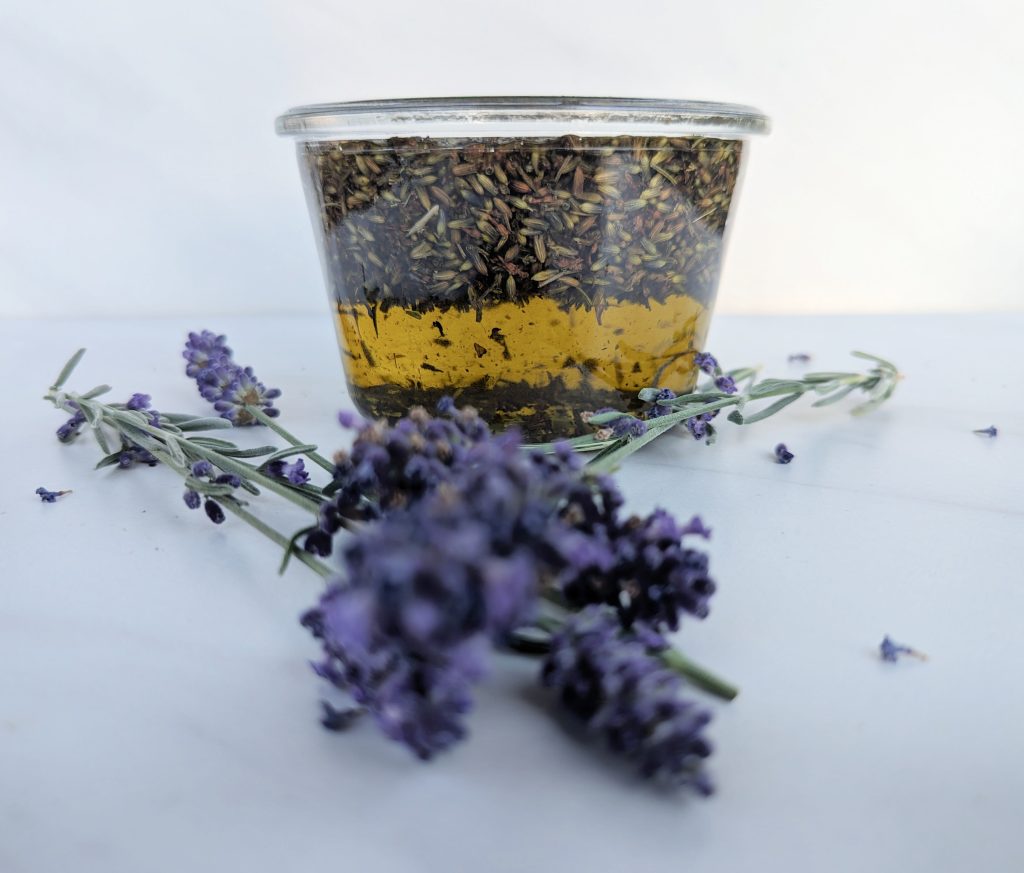
Lemon balm
Lemon balm (Melissa officinalis) is an antidepressant and nervine herb. It is helpful with nervousness, can help ease sadness and depression, calm mania and hysteria, enhances sleep, and helps with memory and concentration. It can also quiet a racing heart, making it a useful remedy for palpitations of a nervous origin. This is a very valuable herb to use when anxiety is causing gastrointestinal upset such as indigestion, acidity, nausea, bloating, and colicky pains.
There are no warnings or cautions with lemon balm.
This can be taken as a weak or cold infusion, tincture, glycerite, or fresh from the garden. As a weak infusion, steep for 30 minutes and take 8oz 1-4 times a day. As a cold infusion steep for 4-8 hours and take 4-8 oz 1-4 times a day. For a tincture take 2-5ml 3 times a day. For a glycerite take 2.5-10ml 3 times a day. You can also take a leaf and eat fresh from the garden, or crumble in your hands and inhale it several times.
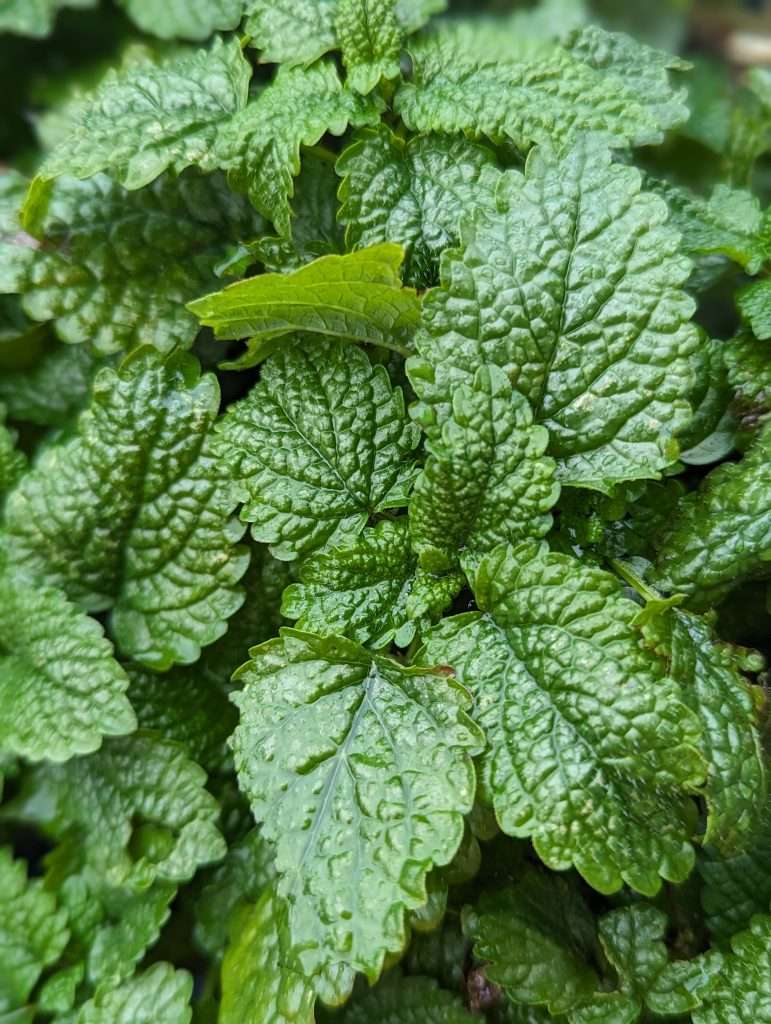
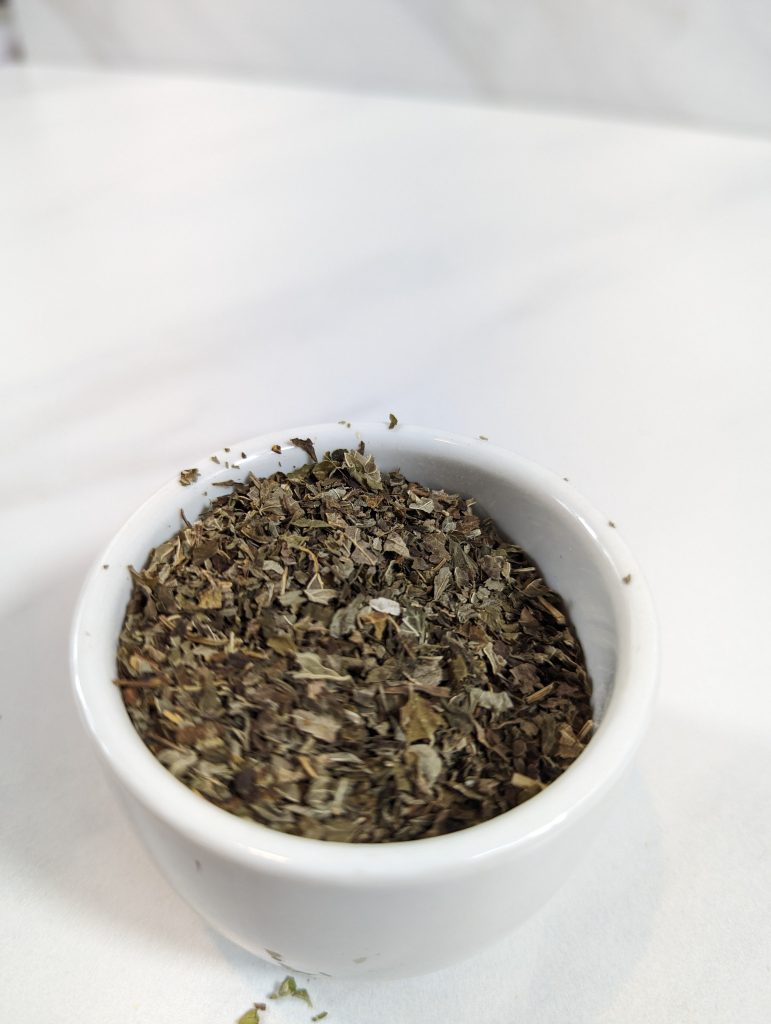
Passionflower
Passionflower (Passiflora incarnate, P. quadrangularis) is a relaxing nervine and sedative. It is often combined with other nervines to help reduce stress and tension and to help with sleep. It can help quiet your mind, restless agitation, and exhaustion.
A 2001 clinical trial found that passionflower was as effective at treating anxiety as oxazepam, a conventional tranquilizer, and had fewer side effects. Another study in 2011 found that it improved their subjects’ sleep quality.
There are no warnings or cautions with passionflower.
It is best taken as a standard infusion, tincture, or glycerite. Taken as a standard infusion, take 4-8oz up to 4 times a day. As a tincture take 2-8ml up to 4 times a day. As a glycerite take 1-3ml up to 4 times a day.
I have used passionflower in my pregnancies and early postpartum several times with great outcomes. I prefer to keep it as a tincture next to my bed to take when I can’t sleep and need to quiet my mind.
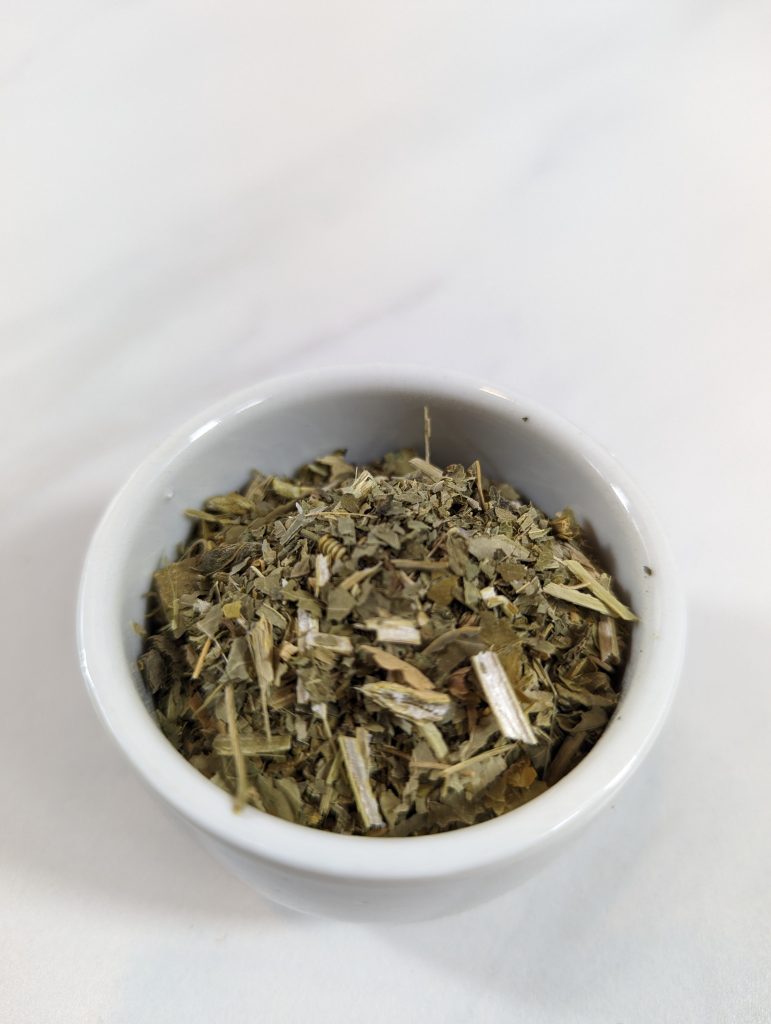
Skullcap
Skullcap (Scutellaria lateriflora) is a relaxing nervine and sedative that can help calm brain function. It is helpful with insomnia, chronic stress, and anxiety. In the nineteenth century, it was used for hysteria.
There are no warnings or cautions with skullcap.
It is best taken as a standard infusion, tincture, or glycerite. As a standard infusion take 4-8oz 3 times a day. As a tincture take 10 drops-5ml 2-4 times a day. Taken as a glycerite take 2-5ml 2-4 times a day.
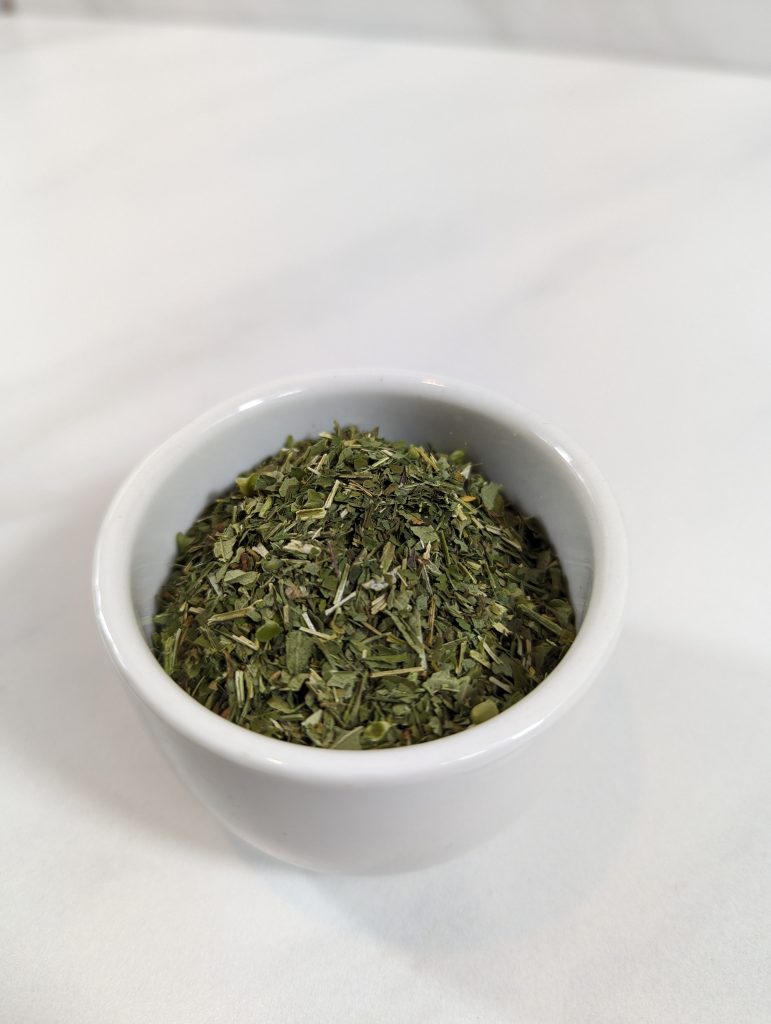
Valerian root
Valerian (Valeriana officinalis) is a popular and strong nervine and sedative. It has tranquilizing effects on the nervous system and is used well with those who have a nervous system condition or insomnia. Many anxiety symptoms such as tremors, panic, palpitations, and sweating can be relieved with valerian root. It is useful for insomnia, whether caused by anxiety or overexcitement.
A caution is that valerian root can cause drowsiness in some and should not be taken with other sleep aids. There are a few people who have the opposite effects and find it stimulating rather than sedating.
Valerian is best taken as a standard infusion. tincture or capsule. As a standard infusion take 4-8oz 30 minutes before sleep. Taken as a tincture take 10 drops – 3ml 30 minutes before sleep or up to 4 times a day for stress. Capsules take 500-1000mg 30 minutes before sleep for insomnia or up to 4 times a day for stress.
My favorite herbs
My overall favorite herbs for coping with anxiety while breastfeeding are:
- Ashwagandha (tincture or capsule)
- Chamomile (tea, essential oil or tincture)
- California poppy (tincture)
- Lavender (as an essential oil)
- Lemon balm (tincture or tea)
- Passionflower (tincture)
- Skullcap (tincture in a formula)
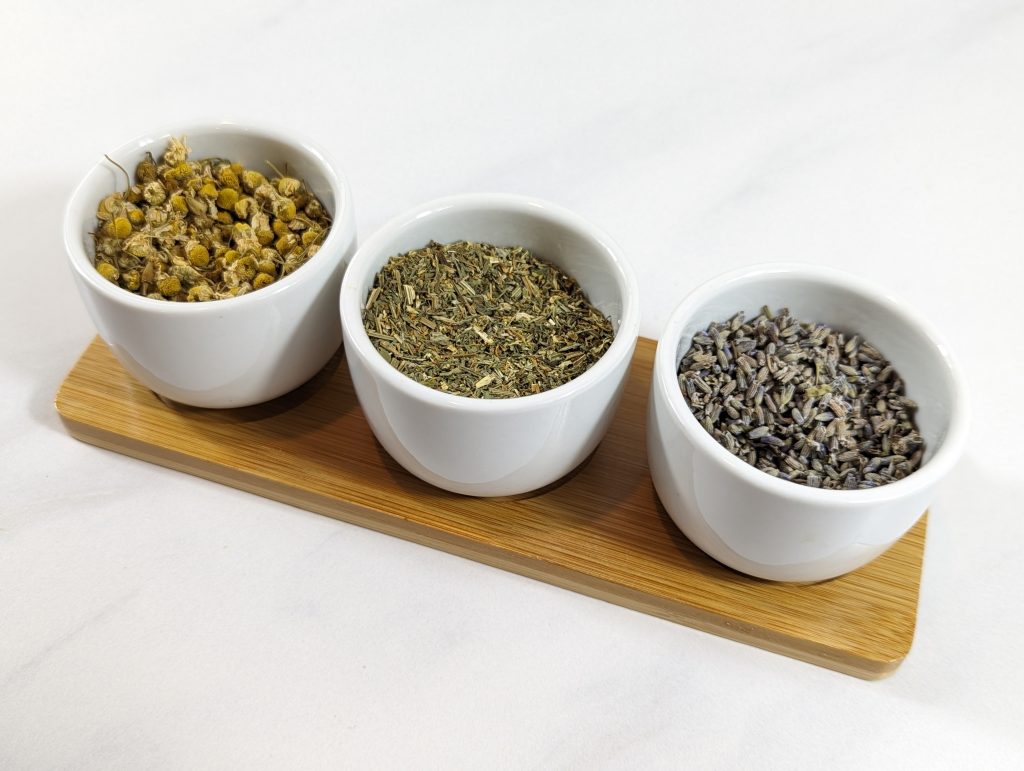
For the herbs above that I take in a tincture form, I make a large batch and use it as needed. I have a dropper bottle I keep around the home for myself and even family members as needed. It can also be given to children in small doses.
Recipe for David Winston’s Anxiety Formula
This is a recipe that was originally formulated for generalized anxiety disorder (GAD) but is also safe to use while breastfeeding. This is not safe for pregnancy, however, as the motherwort is an emmenagogue and can cause a miscarriage. Blue vervain should not be used in early pregnancy but late pregnancy is fine and can protect from miscarriage.
- 2 parts bacopa
- 2 parts motherwort
- 2 parts fresh milky oat seed
- 1 part blue vervain
- 1 part Chinese polygala
Optional add-in of:
- 2 parts passionflower (racing thoughts, insomnia)
- 1 part skullcap (muscle tension, spasms, or anger bursts)
Make the above into a tincture or glycerite. If you do not have the time to make one, you can buy it here. I have not personally tried this recipe but have read good reports about it.
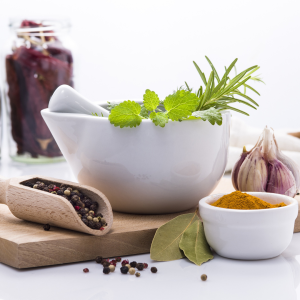
David Winston’s Anxiety Formula
Equipment
- glass container Needs to be large enough to contain all of the herbs and medium.
Ingredients
- alcohol or vegetable glycerin Need enough to submerge the herbs.
- 2 parts bacopa
- 2 parts motherwort
- 2 parts fresh milky oat seed
- 1 part blue vervain
- 1 part Chinese polygala
- 2 parts passionflower optional for racing thoughts, insomnia
- 1 part skullcap optional for muscle tension, spasms, or anger bursts
Instructions
- Add all of your herbs into the chosen container.
- Cover the herbs with your chosen medium of alcohol or vegetable glycerin
- Shake well making sure all herbs are covered.
- Shake glass container at least daily for the first week.
- Let stand in a sunny spot for 4-6 weeks. Make sure herbs stay submerged. Can add more medium after the first few days if needed as herbs will soak it up.
The underlying cause of anxiety
While finding an effective treatment for your anxiety may seem like the best and most important aspect of controlling it, finding the underlying cause of your anxiety will be your ultimate goal.
As with any medical condition, you do not want to just cover up the problem. You will want to get to the root of it. Finding great support and enough information on your particular circumstances will be invaluable. Sometimes support groups can be beneficial as well. Along with a balanced diet and appropriate herbal supplements to aid in your healing in the postpartum period while you’re also nourishing your child and breastfeeding.
Where to buy herbs?
See my resource page for my recommendations on the best places to buy good quality herbs and other products I use.
References for safety of herbs for anxiety while breastfeeding
Chevallier, A. (2016). Encyclopedia of Herbal Medicine: 550 Herbs and Remedies for Common Ailments. Dorling Kindersley Ltd.
Easley, T., & Horne, S. (2016). The modern herbal Dispensatory: A Medicine-Making Guide. North Atlantic Books.
McGuffin, M., Hobbs, C., Upton, R., & Goldberg, A. (1997). Botanical Safety Handbook. https://worldveg.tind.io/record/30342
Wait! There’s still more!
Check out my other blog posts related to this topic of herbalism.
